Akki roti is a delicious staple breakfast from the Southern Indian state of Karnataka. These tasty savory gluten-free flatbreads are made with rice flour, veggies, coconut, herbs, spices and seasonings. Choose from two easy-to-follow methods to make a tasty akki roti recipe. Serve akki rotti hot with your favorite chutney, butter or ghee.
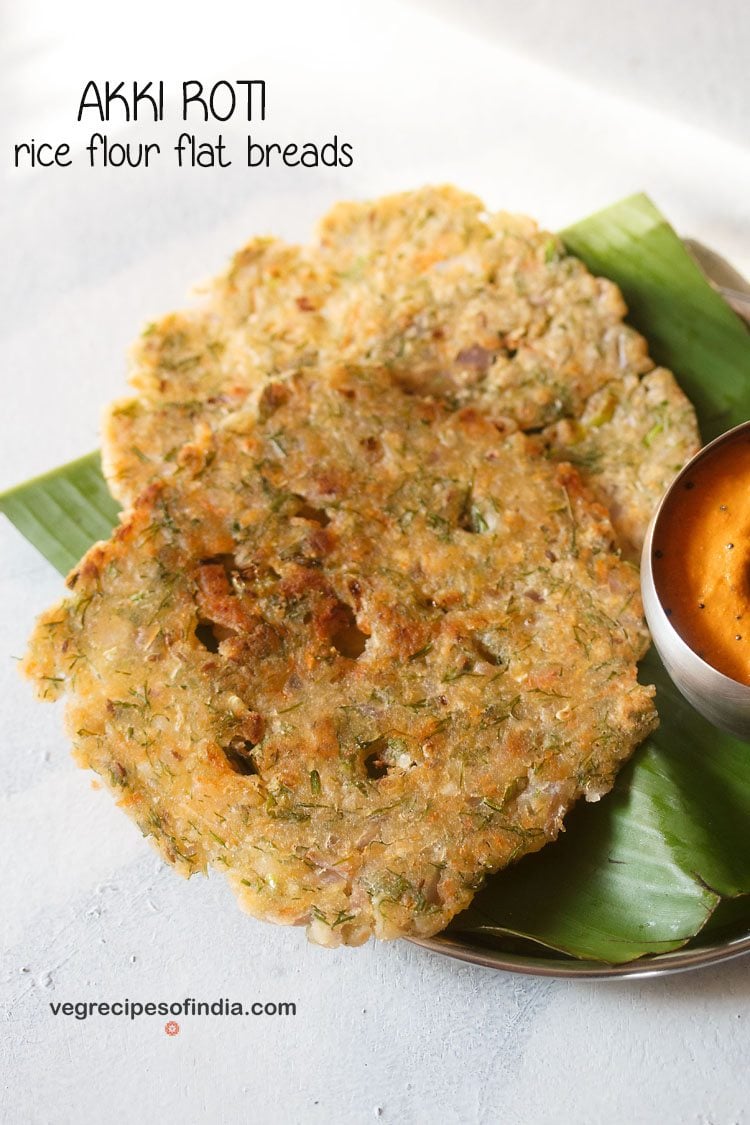
Table of Contents
What is Akki Roti
Akki roti is a special and unique dish from Karnataka state in South India. These are flatbreads made with rice flour and veggies. The Kannada word akki means rice and roti or rotti refers to a flatbread. They are also known as rice flour roti or rice roti.
A point to be noted is that akki rotti is not your plain simple rice roti. A simple rice roti is made with a handful of ingredients – rice flour, water and salt. The rice flour is mixed with hot water and then kneaded to make soft rice roti.
Akki roti recipe includes veggies, coconut, herbs and seasonings added in the dough that make it very flavorful and tasty.
Unlike regular wheat flour based bread recipes you do not need to use a rolling pin to flatten the rice flour dough. You have to pat the dough with your fingers on a banana leaf, a zip lock bag, a moist cotton napkin or parchment paper instead and then cook on a skillet.
It takes some skill to make these flatbreads because rice flour does not have gluten. This can make it tricky to shape.
In the step-by-step recipe, I am sharing two methods of how to flatten the dough. Feel free to choose the method that you prefer.
Practice a few times to make the perfect akki roti. Add the correct proportion of water to the flour to get the best results. If you add less water the roti will become dense. Conversely, if you add too much water to the dough it becomes pasty and sticky.
Serve akki rotti for breakfast or lunch with coconut chutney or any other chutney variety of your choice. You can serve it with a side of ghee (clarified butter) or butter.
How to Make Akki Roti
Get all your ingredients ready before you begin making the rice flour dough.
- Rinse, peel and grate 1 small carrot.
- Peel, rinse and finely chop 1 medium onion.
- Rinse, peel and finely chop 1 inch ginger.
- Rinse throughly a handful of dill leaves and some coriander leaves separately in water using a strainer or colander. Finely chop them.
Next gather the spices, rice flour, seasonings and set aside.
Make Rice Flour Dough
1. In a mixing bowl or pan add the chopped veggies:
- ½ cup of chopped dill leaves (Feel free to skip the dill leaves if you don’t like the taste.)
- ½ cup of grated carrots
- ½ a cup of finely chopped onions
- ⅓ cup of chopped coriander leaves
You can also add 1 to 1.5 tablespoons of finely chopped curry leaves.
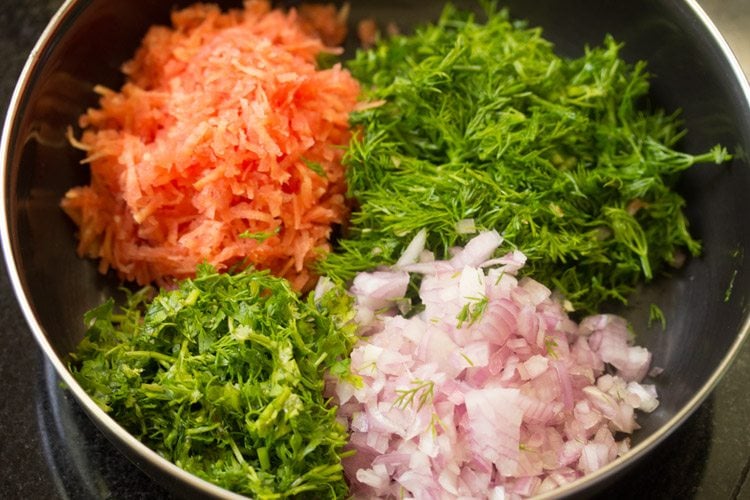
2. Add 1.5 teaspoons of finely chopped ginger and 2 to 3 finely chopped green chillies (about 1 to 1.5 teaspoons finely chopped) to the bowl.
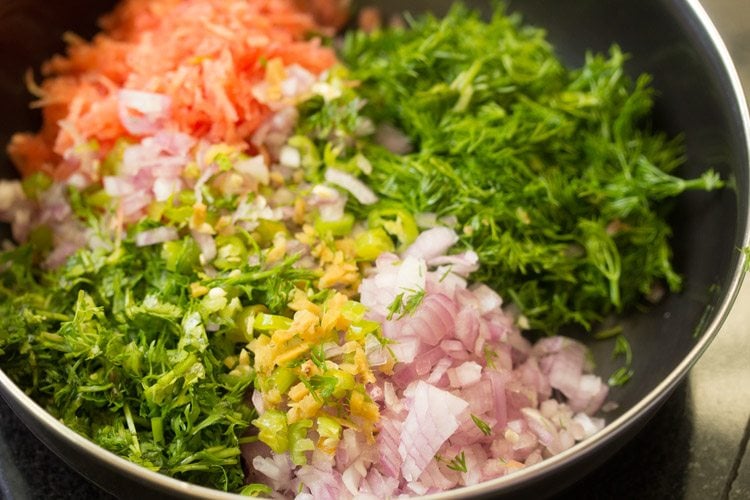
3. Next add ⅓ cup of fresh grated coconut and 1 teaspoon of cumin seeds.
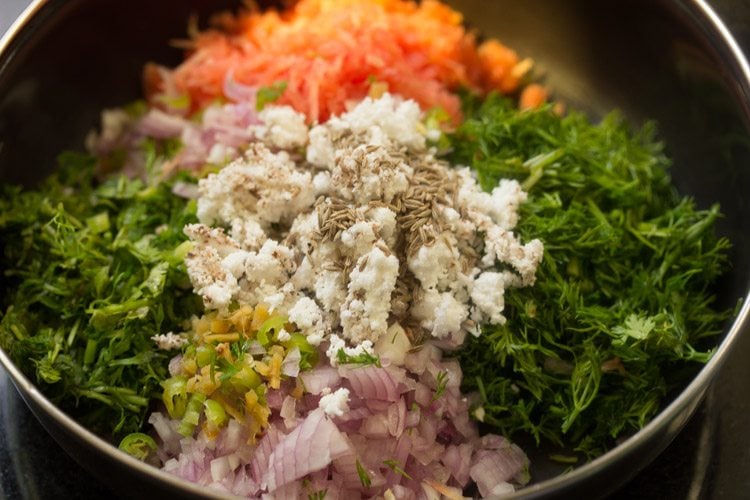
4. Add 1.5 cups of rice flour and salt to taste. Use a finer rice flour and not coarser variety.
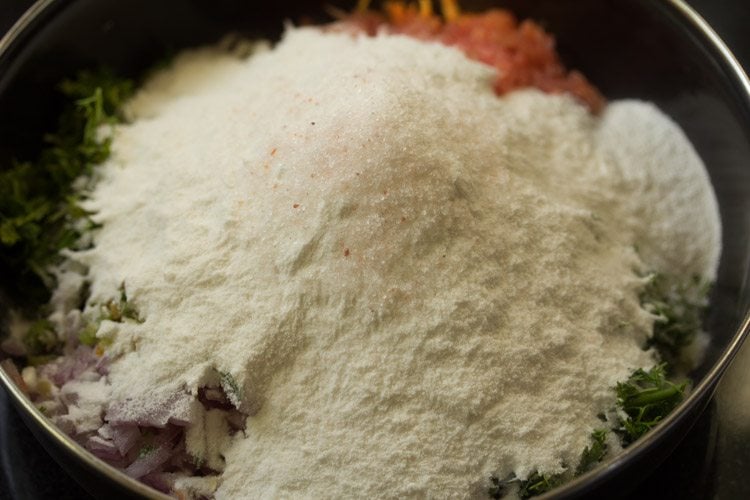
5. Mix well. Then cover the mixture and set aside for 15 to 20 minutes. In this time the onions and dill leaves will release water into the mixture so you can add water accordingly later.
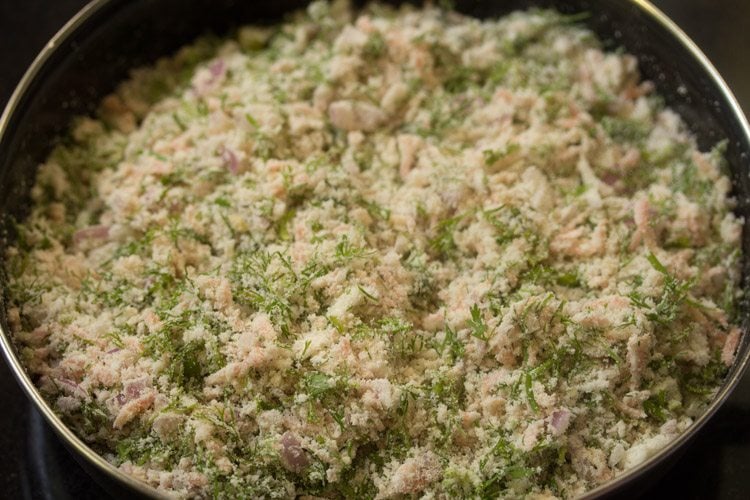
6. Add water in parts to the mixture, mix and knead until a dough forms. I have added ⅔ cup of water. Add water as required depending on the quality of rice flour.
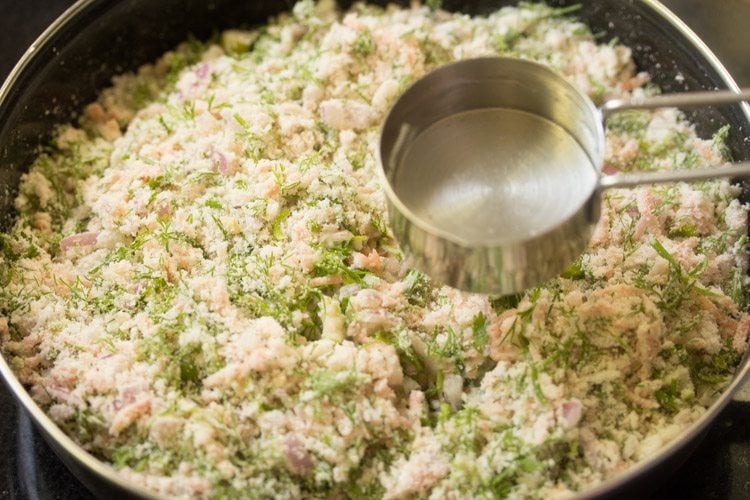
7. Knead into a soft dough.
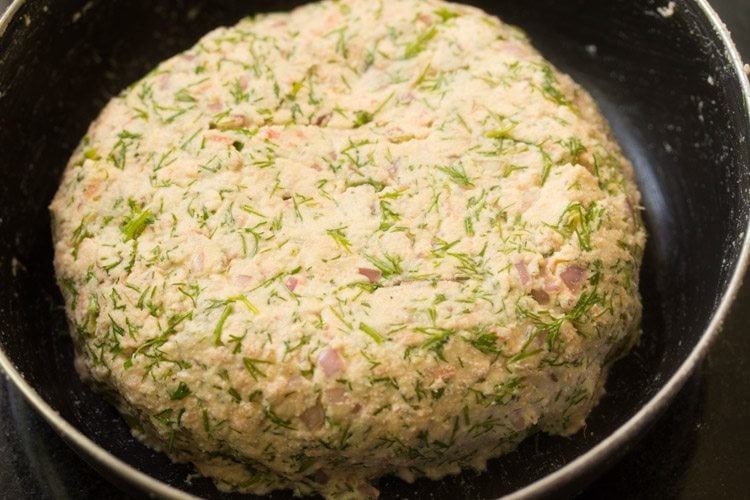
Flatten Dough On Plantain Leaf
1. Rinse a plantain leaf well using water. Use a paper towel or a clean kitchen towel to dry the leaf and then grease it lightly with oil.
Take a small portion of the leaf which can easily be kept on the tawa or skillet.
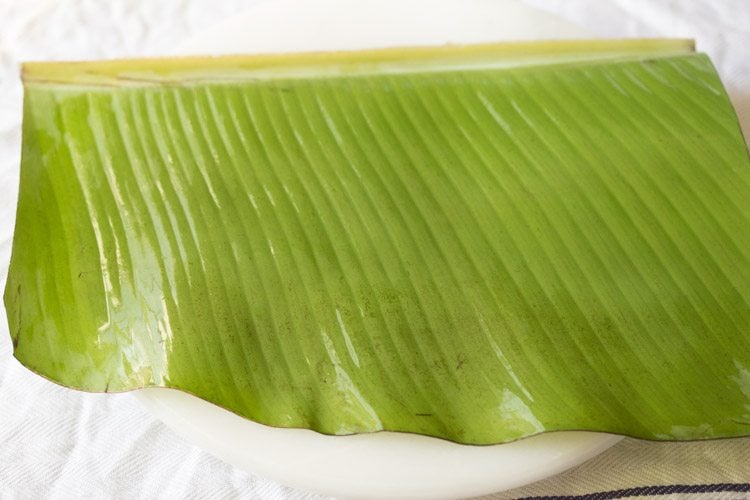
2. Roll a handful of the rice dough into a ball and place it on the banana leaf.
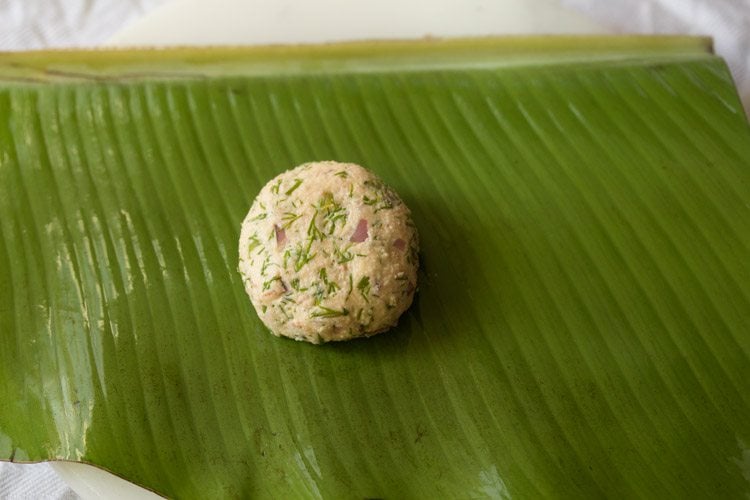
3. Next, use the palm of your hands to flatten the dough to get an even-sized roti. Make sure the akki roti is not too thick or very thin.
You can lightly moisten your fingers with water while patting and flattening the rice dough.
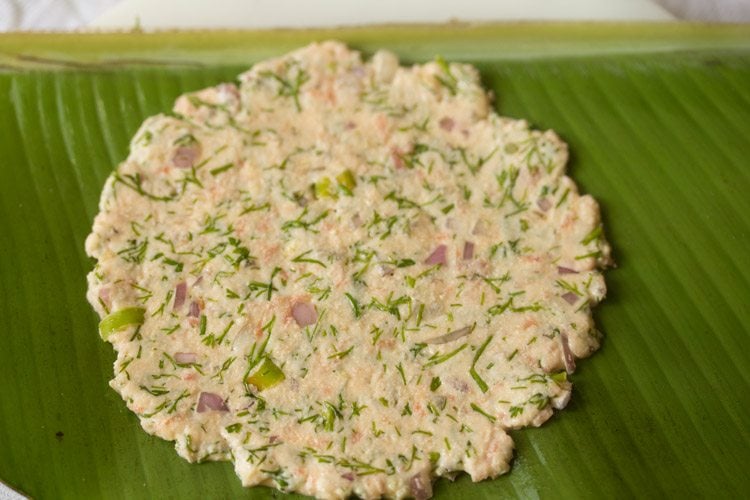
4. Press some holes into the dough with your fingers. This is an optional step.
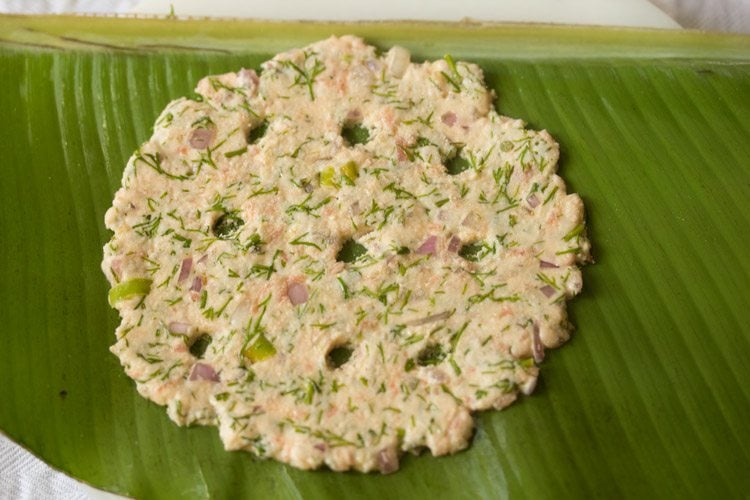
5. Meanwhile, heat a tawa or skillet. Once the tawa is hot, spread some oil on it using a spoon. If you are using a tawa then make sure that it is well-seasoned tawa.
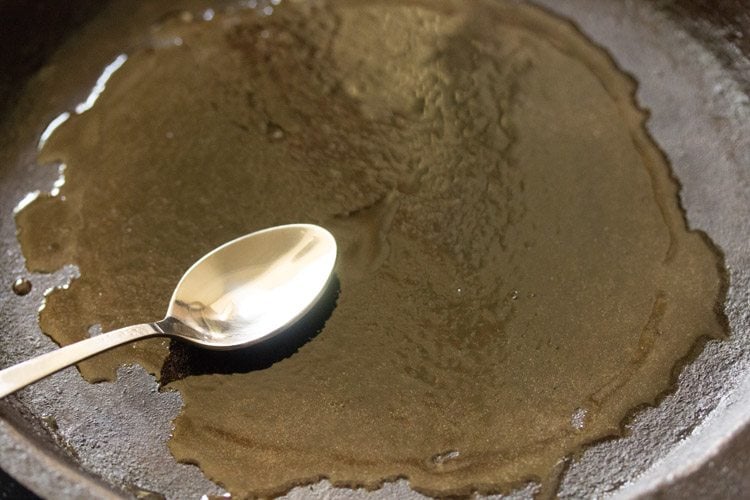
6. Lift the plantain leaf gently and bring it near the tawa.
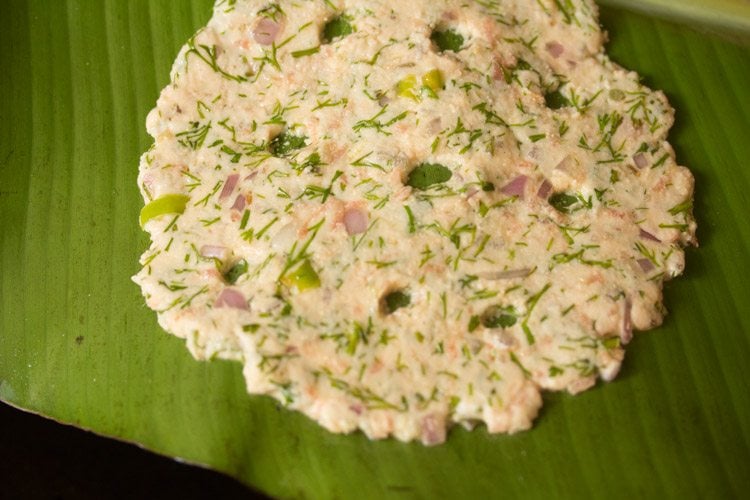
Cook Akki Rotti
7. Gently place the side with the roti facing down on the tawa.
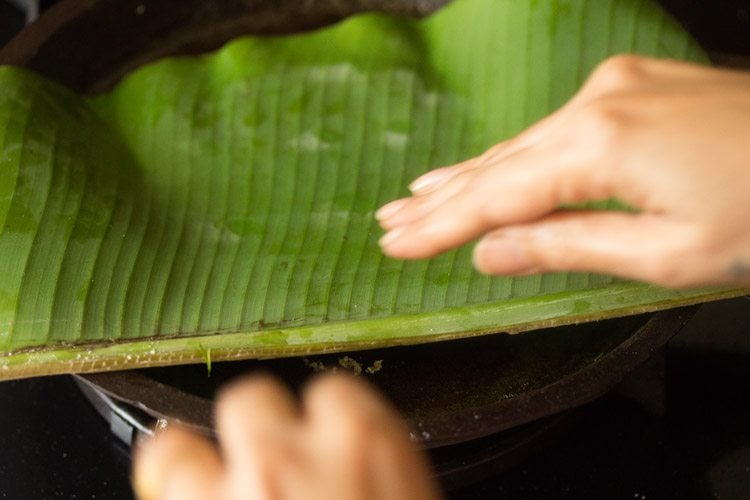
8. Wait for a few seconds and then gently lift the leaf from the akki dough.
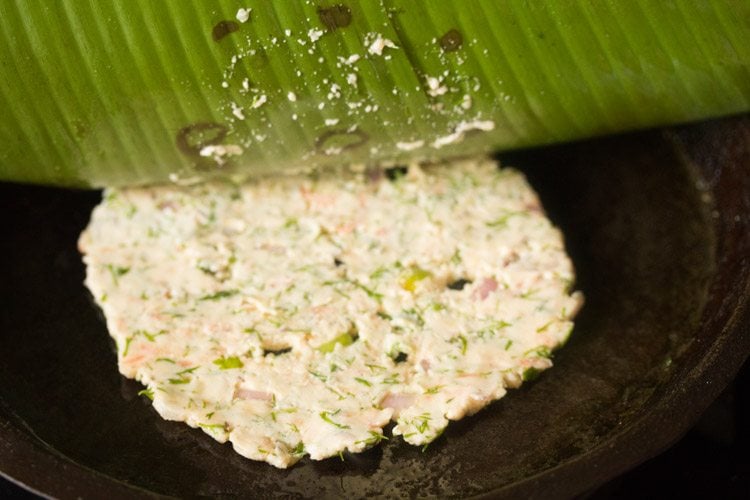
9. Cook the roti on a medium heat.
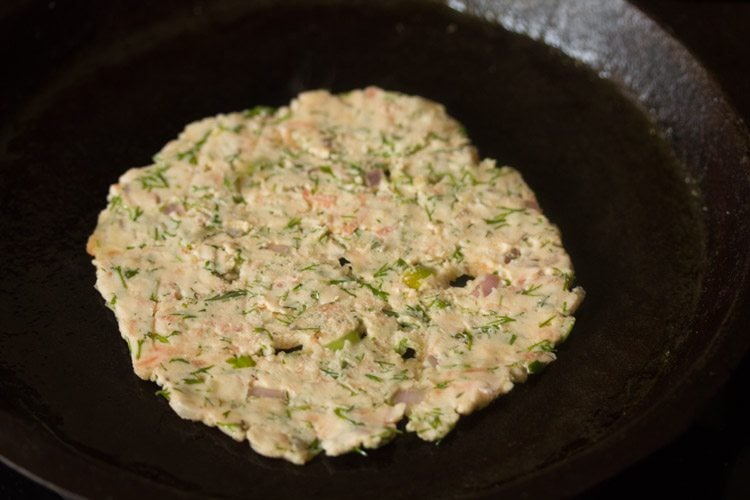
10. Drizzle about ½ teaspoon of oil or as required in the holes and on top of the rice roti dough.
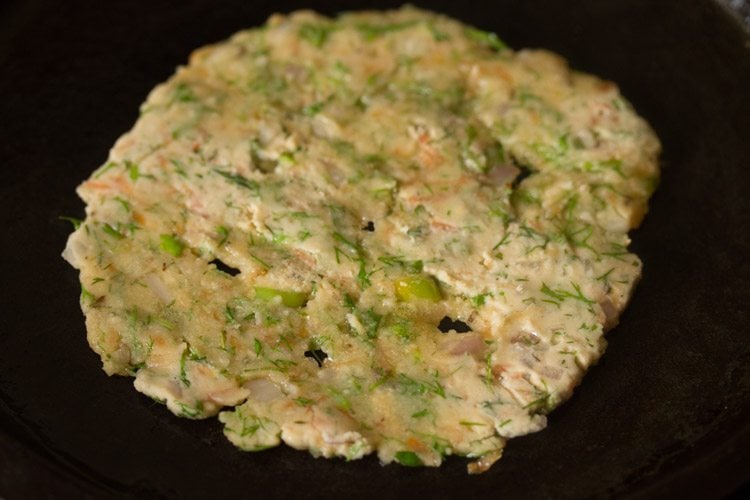
11. When the base gets light golden and crisp flip the akki rotti.
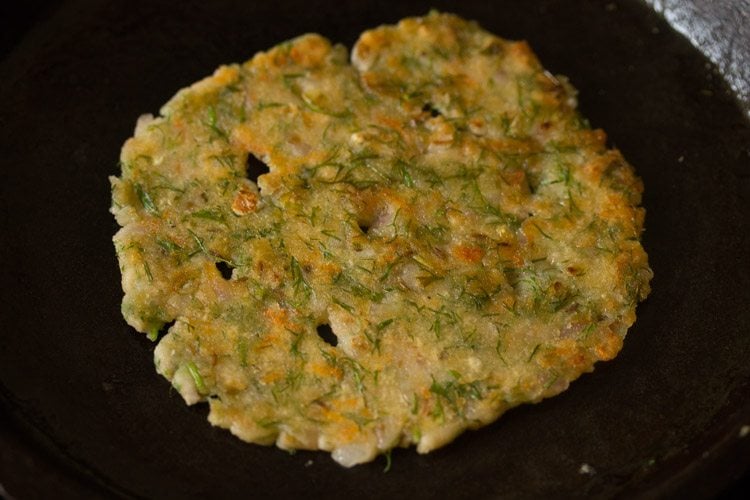
12. Cook this second side for a light golden and crispy akki roti. Add a bit of oil if needed. Remove and serve akki roti with coconut chutney.
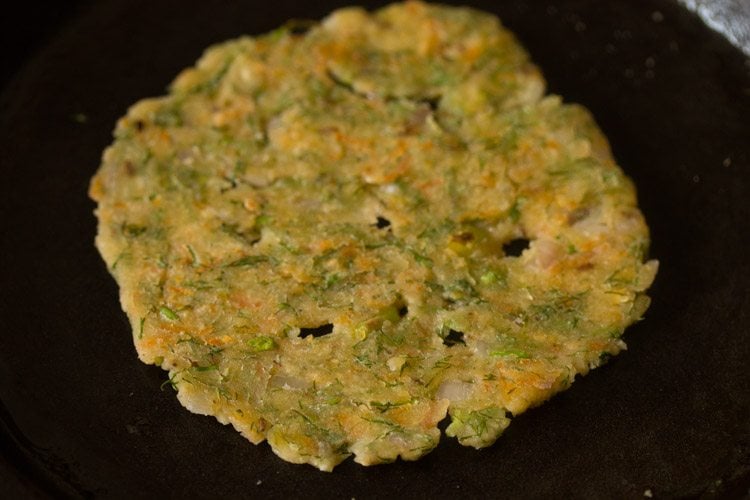
Make Akki Roti on Tawa or Skillet
1. Place a tawa or a skillet on the stovetop. Grease some oil on the tawa and do not heat the tawa.

2. Then take a handful portion of the rice dough and shape it into a neat ball between your palms. Place this rice flour dough ball on the tawa or skillet. Flatten the portion of the dough on the tawa with your fingers to a neat roti ensuring it is neither too thick or too thin.
Dip your fingers lightly in a small bowl filled with some water and then flatten the roti dough.
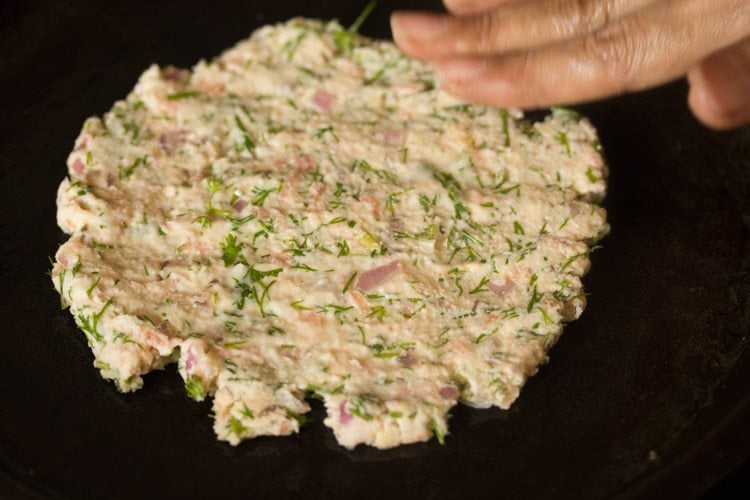
3. After you complete flattening the roti dough, turn on the heat and let the tawa or skillet become hot on a medium flame. As the tawa becomes hot, it will cook the roti.
Cook the akki rotti as mentioned in the above steps. The roti should be light golden in color.
Feel free to prepare akki roti recipe using your preferred method. For the second method, you can choose to keep two tawa or skillet side by side to prepare akki roti.
Once the roti has cooked on one the skillet or tawa, switch it off and then use the second tawa. This will help you to alternate between the two while making akki roti.
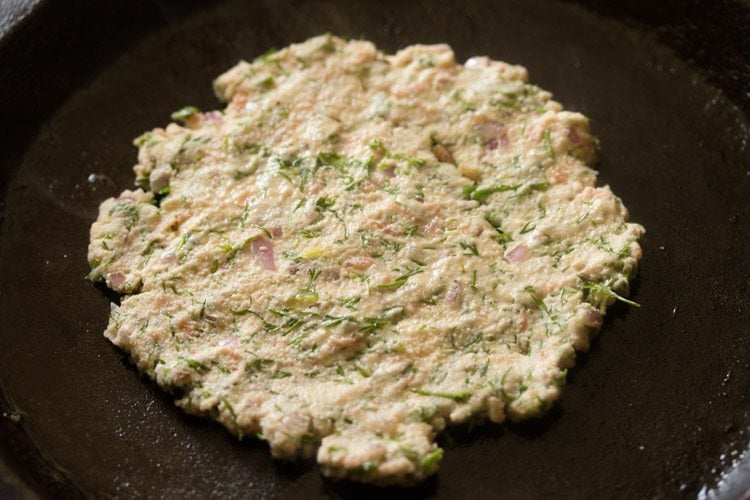
4. Akki Roti is best served hot with coconut chutney, any other chutney of your choice, with a side of ghee or butter.
In the photo below I have served the akki roti with capsicum chutney and it was simply mouth-watering!
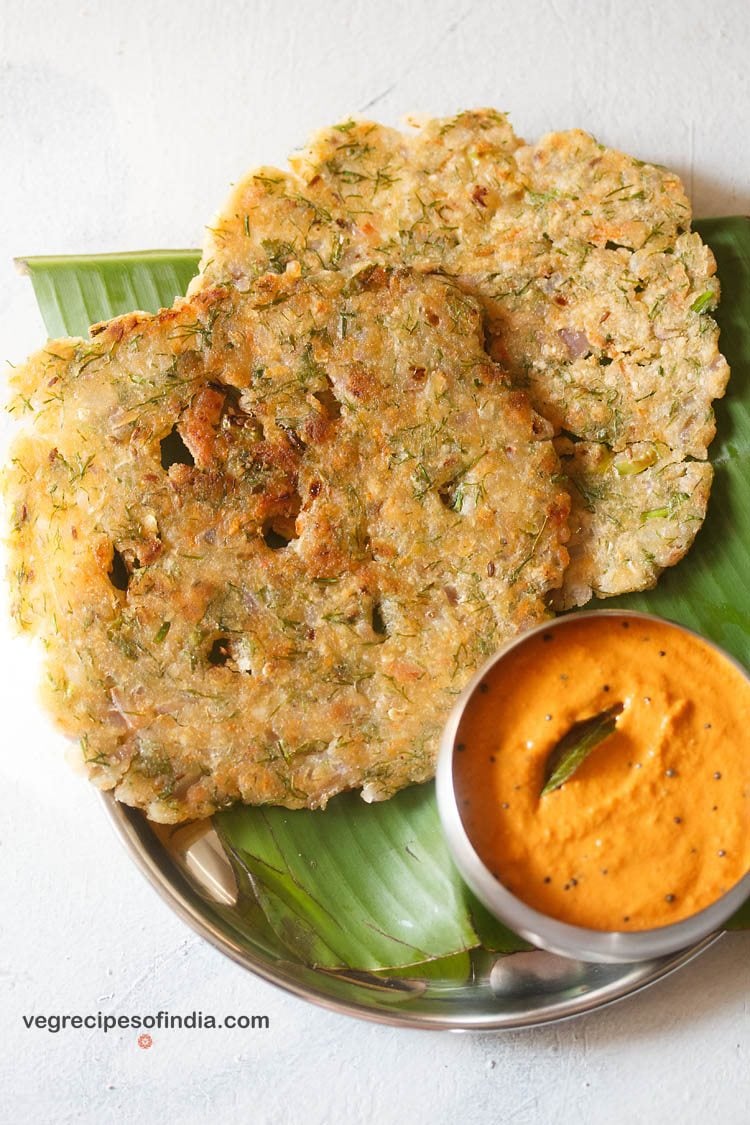
Expert Tips for Akki Rotti
- Water: When preparing the dough you will need to add water to make it moist and soft. Touch the dough as you add the water as you want a fairly soft dough and add water as required. Depending on the water content in the vegetables, add less or more water while kneading the dough.
- Vegetables: One of the great things about this recipe is that any veggies of your choice can be added to suit your taste. For this recipe, some options to choose from are: cabbage, carrots, drumstick leaves, dill leaves, bottle gourd, fenugreek leaves, cucumber, zucchini, spinach and amaranth. These veggies work perfectly and add a lot of flavor to the akki roti. Also remember to finely chop the veggies and herbs.
- Rice Flour: The texture of rice flour is important to make a soft as well as lightly crisp akki roti. Ensure that your rice flour is finely ground and has a floury texture. It should not feel granular or have a semi-fine or coarse consistency as this won’t give you a soft akki roti and while rolling the rice roti dough can break.
- Veggie free: You can still enjoy this recipe if you are not too keen on vegetables. Add or skip them altogether to make a veggie free akki roti recipe. The remaining steps in the recipe will remain the same and don’t forget to make sure that the dough is soft after kneading.
- Batch: Feeding a crowd? This recipe can be altered by doubling or tripling the ingredients.
Akki Roti FAQs
Storing the akki roti in the banana leaf will not alter the taste as the roti is not actually being cooked in the banana leaf. It is possible that the taste may have a mild flavor from the banana leaf but this is not noticeable.
Yes, you certainly can. The dough can last for up to 1 day in the refrigerator. If you want to refrigerate the dough then knead the dough until soft. Place the dough into a lightly greased bowl. Cover tightly with a plastic wrap and store in the refrigerator.
After being cooked, akki roti taste best when served hot or warm. Storing them for some hours, may make them dry or chewy. If you want to make ahead, then I suggest to make the dough a day before and refrigerate it in a bowl or container covered tightly with a lid or with a plastic wrap.
More Healthy Roti Varieties To Try!
Indian Breads
Indian Breads
Vegan Recipes
Indian Breads
Please be sure to rate the recipe in the recipe card or leave a comment below if you have made it. For more vegetarian inspirations, Sign Up for my emails or follow me on Instagram, Youtube, Facebook, Pinterest or Twitter.
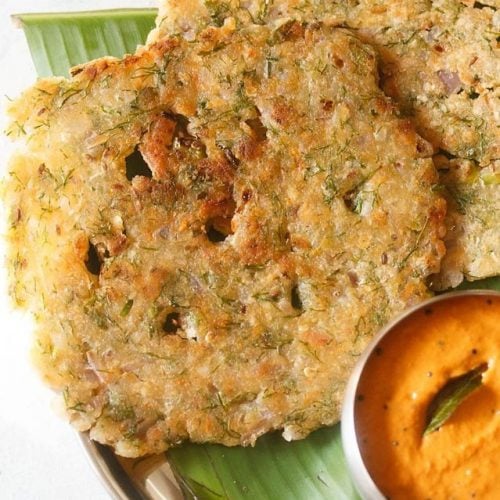
Akki Roti (2 Ways) | Akki Rotti | Rice Roti
Ingredients
- ½ cup finely chopped dill leaves – 20 grams, optional
- ½ cup finely chopped onions – 80 grams
- ½ cup grated carrots – 120 grams
- ⅓ cup coriander leaves (cilantro) – 10 grams
- 1.5 cups Rice Flour – 225 grams, finer and smooth variety
- 1.5 teaspoons finely chopped ginger
- 2 to 3 green chilies, finely chopped or 1 to 1.5 teaspoon finely chopped
- 1 to 1.5 tablespoons finely chopped curry leaves – optional
- 1 teaspoon cumin seeds
- ⅓ cup grated fresh coconut
- ⅔ cup water or add as required
- salt as required
- oil as required for roasting
- 1 plantain leaf – small to medium sized or butter paper or parchment paper or ziplock bag or a moist cotton napkin
Instructions
Preparing rice flour dough
- Take the chopped dill leaves, grated carrots, finely chopped onions and chopped coriander leaves in a mixing bowl or a pan. Dill leaves can be skipped. You can also add finely chopped curry leaves.
- Add 1.5 teaspoons finely chopped ginger, finely chopped green chilies, grated fresh coconut and cumin seeds.
- Add rice flour and salt as per taste.
- Mix everything very well. Cover and keep aside for 15 to 20 minutes.
- Now add water in parts. I have used ⅔ cup water. Do add water as required depending on the quality of rice flour and the water content in the vegetables.
- Mix and knead to a soft dough.
Making akki roti on plantain leaf
- Rinse a plantain leaf very well. Take a small portion of the leaf which can easily be kept on a tawa or skillet. Wipe dry the leaf and then spread a bit of oil on it.
- Roll a handful of the rice dough into a ball and place it on the banana leaf.
- With your palms, gently pat and flatten the dough to get an even sized roti. You can lightly moisten your fingers with water while patting and flattening the rice dough.
- Do not make the roti too thick or too thin.
- Poke some holes in the dough. This is an optional step.
- Meanwhile, also heat a tawa or skillet. When the tawa gets hot, spread some oil on it. Use a well seasoned tawa or skillet.
- Lift the plantain leaf gently and bring it near the tawa.
Cooking akki roti
- Now gently place the side with the roti touching the tawa.
- Wait for a few seconds and then gently lift the plantain leaf.
- On a medium heat cook akki rotti. Drizzle some oil in the holes on the roti dough and on top of the roti.
- When the base gets light golden and crisp, flip the roti with a spatula.
- Cook the second side also till lightly golden and crisp. Remove and serve hot with coconut chutney or with a side of ghee or butter.
Making akki roti on tawa or skillet
- Keep a tawa or skillet on the stovetop. Do not heat the tawa.
- Spread some oil on the tawa. Take a handful portion of the dough and shape into neat round ball between your palms.
- Place this dough ball on the tawa and flatten it. Dip your fingers lightly with water when patting the dough to flatten it to a neat roti ensuring it is neither too thick or too thin.
- After the dough has been flattened on the tawa or skillet, then switch on the heat of the stove-top. Begin to heat the tawa on medium flame.
- As the tawa gets heated up, the roti will begin to cook. Drizzle some oil on the roti.
- When one side is light golden flip the roti with a spatula. Cook the second side until light golden. Add a bit of oil if needed.
- When the second side is light golden and crisp, remove and serve hot or warm.
- Prepare the roti in batches using the method which suits you.
- Serve akki roti hot with coconut chutney or any chutney variety of your choice. Do remember to have them hot for best taste. They also taste good with a side of ghee or butter.
Notes
- Make sure that the skillet or tawa is well seasoned, so that the roti does not stick while cooking.
- Add water as required. The dough should be soft and smooth. The amount of water needed will vary with the quality of rice flour and the vegetables used. If high water content vegetables are included like bottle gourd or zucchini, you will need to add less water.
- Make sure to use a finer rice flour and not a coarser variety. Homemade rice flour gives a good flavor, but packaged store-brought rice flour also works well.
- You can add veggies of your choice. The veggies that can be added are cabbage, carrots, drumstick leaves, dill leaves, zucchini, bottle gourd, fenugreek leaves, cucumber, spinach and amaranth.
- Without veggies, also you can make the akki roti.
- Enjoy them hot with your favorite chutney and with a side of butter or ghee.
- The recipe can be halved or doubled.
Nutrition Info (Approximate Values)
This akki roti recipe post from the archives, first published on May 2017 has been republished and updated on 12 November 2021.
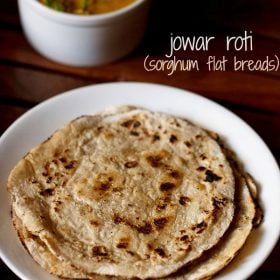
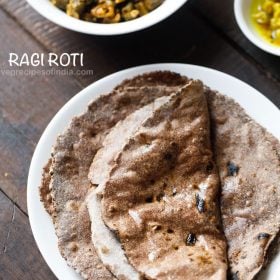
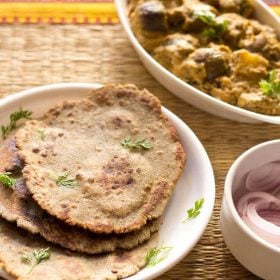
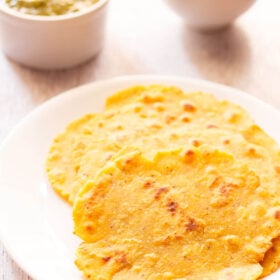
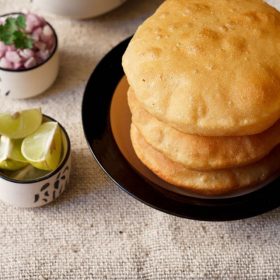
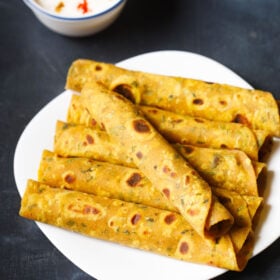

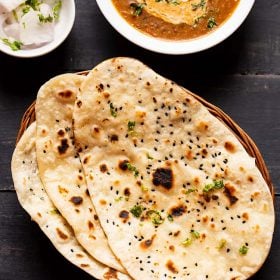








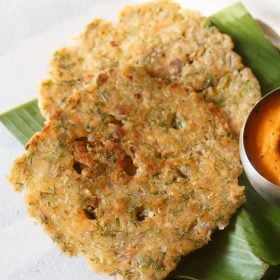
Mrs Amit i whole heartedly thank u for producing us such a fantastic app here with varieties of dishes and ideas..Thanks a lot and i just want to know whether there would be any differences in taste if the rotti isn’t kept in Banana leaf and should v use separate banana lead for each rotti?
thanks amna. there is not any difference in taste as the roti is not cooked in the banana leaf. a mild banana flavor will be there but it not noticeable. i have used the same banana leaf for making the rotis. you can even use around 2 banana leaves.
another great recipe AND listing the ingredients in grams…….well done
thanks iain